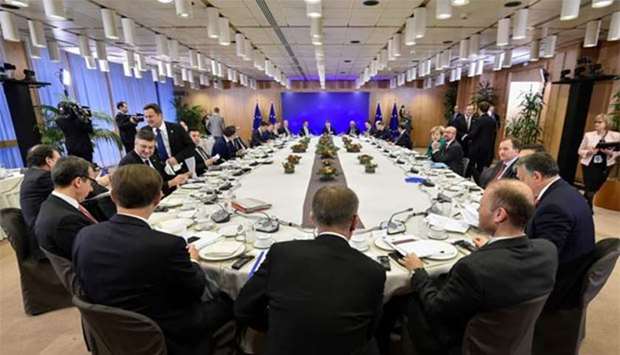* PM attended Brussels summit after securing new trade talks
* EU leaders to give formal green light on Friday* Government lost awkward Brexit vote in parliament
* Austria warns that "riddles remain" on Irish border issue
The European Union is poised on Friday to move talks forward with London on Britain's exit from the bloc as leaders warm to the British premier but there was little clarity on trade issues and Austria warned the Irish border issue remained a "riddle".
On the second day of a summit in Brussels, leaders will agree that "sufficient progress" has been made after a deal on citizens rights, the Irish border and Britain's outstanding payments, giving negotiators a mandate to move onto the main phase of talks.
"We will give the mandate for preparation for the Commission and ourselves for the negotiations for the future of our relations," Lithuanian President Dalia Grybauskaite said, seeing those talks formally starting in March.
A day after she suffered a defeat in parliament over her blueprint for quitting the EU, Prime Minister Theresa May won applause from her peers on Thursday evening. She said she was on course to deliver Brexit and urged them to speed up the talks to unravel more than 40 years of membership.
But several hours later as leaders reconvened, European Commission President Jean-Claude Juncker and Italy's Prime Minister Paolo Gentiloni warned that the hardest decisions were still to come as Britain tries to extricate itself from rules agreed over years in the bloc.
Austrian Chancellor Christian Kern went further, saying even a primary school student could see that the "first phase" deal on the Irish border would come back to haunt the talks because it was impossible for Britain to leave the bloc's single market while avoiding a hard border on the island of Ireland.
"There cannot be any border controls between Northern and southern Ireland, there cannot be border controls between Northern Ireland and the UK, but there can between UK and the EU," he said.
"So our primary school students can see that there is a riddle to be solved."
As May left to return to London -- she will not join the other 27 leaders for further discussions on Brexit and the euro zone -- she said she was eager to move on, once her peers give the formal green light to trade talks on Friday.
The EU is willing to start talks next month on a roughly two-year transition period to ease Britain out after March 2019, but has asked for more detail from London on what it wants before it will open trade negotiations from March of next year.
'Time is of the essence'
Ireland's Prime Minister Leo Varadkar cautioned that there were "quite divergent opinions" on how a new relationship and transition would look. EU officials are divided over whether Britain should continue to receive the full, unfettered economic benefits of EU membership during a transition after it leaves, even if it loses political representation in Brussels.
A British government official said the prime minister was approaching the next phase, which will discuss a transition period as well as the terms of the future trading relationship, "with ambition and creativity".
German Chancellor Angela Merkel gave her stamp of approval, but cautioned time was running out.
"We made clear that Theresa May has made an offer that should allow us to say that we have seen sufficient progress," she told reporters. "Nevertheless, there are still a lot of problems to solve. And time is of the essence."
Summit chair Donald Tusk will call May on Friday to update her after leaders have discussed their next moves on Brexit.
May, weakened after losing her Conservative Party's majority in a June election, has so far carried her divided government and party with her as she negotiated the first phase of talks on how much Britain should pay to leave the EU, the border with Ireland and the status of EU citizens in Britain.
But the next, more decisive phase of the negotiations will further test her authority by exposing the deep rifts among her top team of ministers over what Britain should become after Brexit.
The deal almost fell apart last week, when May's Northern Irish allies rejected an initial agreement for fear that a promise to protect a free border with EU member Ireland could separate their region from the rest of the UK.

